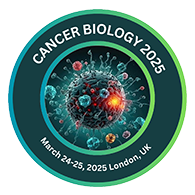Call for Abstract
Scientific Program
23rd International Conference on Cancer Biology and Cell Science, will be organized around the theme “Theme: Decoding Cancer: Integrative Approaches in Biology and Therapeutics”
Cancer Biology 2025 is comprised of keynote and speakers sessions on latest cutting edge research designed to offer comprehensive global discussions that address current issues in Cancer Biology 2025
Submit your abstract to any of the mentioned tracks.
Register now for the conference by choosing an appropriate package suitable to you.
This session explores cutting-edge cellular therapies, such as CAR T-cell therapy and NK cell-based treatments, which leverage the body’s immune cells to target and destroy cancer cells. It will focus on clinical advances, challenges, and innovations in cellular therapy for various cancers.
Focusing on precision medicine, this session discusses the latest developments in targeting specific genetic and molecular abnormalities in cancer cells. It will cover the use of genomic profiling and biomarker-driven therapies for personalized cancer treatment.
CRISPR and other gene-editing tools are revolutionizing cancer treatment by allowing for precise alterations in the cancer genome. This session explores how CRISPR technology is being used to target oncogenes, repair DNA damage, and enhance immune cell therapies.
Stem cells play a dual role in cancer biology, acting as both a source of cancer stem cells and a target for innovative therapies. This session covers breakthroughs in targeting cancer stem cells and their role in metastasis and resistance.
This session will focus on the integration of immunotherapy into precision medicine, highlighting how patient-specific immune responses are being harnessed through checkpoint inhibitors, vaccines, and personalized cellular immunotherapies for improved cancer outcomes.
The heterogeneity within tumors presents significant challenges to treatment. This session will discuss how advances in single-cell sequencing and molecular profiling enable more accurate, personalized treatment plans, leading to better outcomes.
Cancer cells undergo metabolic reprogramming to sustain growth and survival. This session explores therapeutic strategies targeting altered cancer metabolism, including glycolysis and lipid metabolism, to disrupt cancer cell growth and enhance treatment precision.
Exosomes, small vesicles involved in cell communication, play a critical role in cancer progression and metastasis. This session focuses on the role of exosomes in cellular signalling, immune evasion, and their potential as diagnostic biomarkers and therapeutic targets.
Epigenetic changes, such as DNA methylation and histone modifications, are key players in cancer development. This session will cover how targeting these modifications through precision medicine can reprogram cancer cells and improve therapy efficacy.
Drug resistance remains a major hurdle in cancer therapy. This session will examine the cellular mechanisms behind resistance, including efflux pumps and DNA repair pathways, and how personalized therapies can overcome these obstacles.
The tumor microenvironment significantly impacts cancer progression and therapy resistance. This session explores novel approaches to modify or target the microenvironment, including stromal cells, immune cells, and extracellular matrix components, to enhance therapeutic outcomes.
AI is transforming oncology by predicting patient responses and optimizing treatment plans. This session covers how AI and machine learning are being integrated into cellular therapies and precision medicine to revolutionize cancer treatment strategies.
Cancer cells often evade normal cell cycle controls, leading to unchecked growth. This session explores how novel drugs targeting cell cycle regulators are being used in precision oncology to arrest tumor growth while sparing healthy cells.
Liquid biopsies offer a non-invasive approach to cancer diagnosis and treatment monitoring. This session discusses the latest advancements in using circulating tumor cells (CTCs), DNA, and exosomes for real-time tracking of treatment responses and personalized cancer care.
Organoids and 3D cultures are revolutionizing cancer research by providing patient-specific models for drug testing. This session will explore how these cellular models are being used to predict therapeutic responses and develop individualized cancer treatment plans.
Cell-based drug delivery systems are transforming how cancer drugs are targeted and released. This session focuses on innovative delivery platforms, including nanoparticles and engineered immune cells, which enhance the precision of cancer treatments.
RNA therapies, including siRNA, miRNA, and mRNA vaccines, offer precise ways to target cancer at the molecular level. This session will explore how RNA-based treatments are being developed to disrupt cancer cell signalling and stimulate immune responses.
Autophagy, a cellular process for degrading and recycling cellular components, plays a complex role in cancer survival. This session will focus on how targeting autophagy pathways can lead to new precision treatments that either enhance or inhibit this process in cancer cells.
Personalized cancer vaccines are designed to trigger patient-specific immune responses against tumours. This session will highlight the latest research in creating vaccines based on individual tumor mutations, enhancing the precision and efficacy of cancer immunotherapy.
Cellular senescence acts as a tumor suppressive mechanism, but can also contribute to cancer progression. This session explores the dual role of senescence in cancer and how therapies targeting senescent cells may enhance precision cancer treatments.

